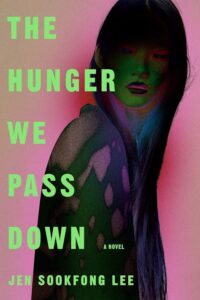 Title: The Hunger We Pass Down
Title: The Hunger We Pass Down
Author: Jen Sookfong Lee
Publisher: McClelland & Stewart
Publication Date: September 9, 2025
Genres: Mystery, Fantasy, Paranormal, Contemporary, Historical
Length: 384 pages
Source: I borrowed it from the library.
Rating: 4 Stars
Blurb:
Content Warning: Alcoholism, kidnapping, rape, pregnancy, abortion, miscarriage, childbirth, mental health (depression and, depending on how one interprets certain scenes, delusions and hallucinations), domestic violence, car accident, cancer, murder, and demonic possession. I will not be discussing these topics in my review.
Review:
What does it mean to be a survivor?
This was a heavy read at times, but it was also an important one. It’s easy to sanitize the past but much more difficult to take a clear look at what previous generations endured and how their experiences can still affect even those descendants who were born decades after their deaths. I found it especially interesting to take note of the personalities of the various women in this family – as nearly all of the characters were women – and see how the same habits and mannerisms echoed through the generations with some individuals being able to express much healthier versions of these traits than their mothers or grandmothers did depending on what their lives were like and how much they’d been able to heal from their trauma. I must tip my cap to Ms. Sookfong Lee for all of the work she put into crafting their personalities and giving readers small hints of how everyone was similar to each other.
The ending did feel a little rushed to me after spending 300+ pages building up tension and digging deeply into the secrets and mysteries of the Chow family. I was expecting the final confrontation to take up much more space in the storyline than it did, and so I was let down by how quickly things were resolved. If more time had been spent on those last few chapters, I would have happy chosen a full five-star rating as this novel was otherwise an excellent example of how the horror genre can be used to explore all sorts of serious, real-world topics that many families can be reticent to talk about.
My favorite scenes were the ones that invited the audience to think about the multitude of ways that intergenerational trauma can be passed down over and over again even if someone is aware of what is happening and knows their behaviour isn’t emotionally healthy. I loved the way the author left space for readers to interpret certain scenes from a wide variety of psychological and supernatural perspectives. Was the antagonist literally real, a vivid metaphor for how generations of unresolved trauma have metaphorically haunted this family, or some combination of these two possibilities? I have my own theories about that topic but don’t want to influence anyone else’s perspective before they’ve read this. What matters is that new readers think for themselves as they encounter new clues about what is going on and trace every thread of this story from 1939 to 2025.
The Hunger We Pass Down made me yearn for a sequel.
